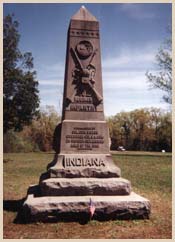
|
The Battle of Shiloh (Pittsburg
Landing, Tennessee) As the firing raged ahead, the men picked up their pace. Moore recalled "an indefinable feeling which seems to precede great battles - a feeling at that time so new to us we did not recognize it." In the dark and rain, the Federal troops of the Army of the Ohio boarded steam boats that would take them to Pittsburg Landing. The boys of the 30th had to fight their war through ambulances and the wounded. Regimental bands played at the Landing to try to cheer the terrified masses that gathered there, but Moore found the music "a little out of place." The 30th was greeted by "a scene calculated to make a profound impression on an imaginative boy lately loosed from his mother's apron strings." Dawn of April 7, 1862 found the 30th ready for battle. Stripping of their knapsacks, the men moved into the thick woods to the shouting of their officers in an attempt to keep their ranks aligned. With no enemy in sight, the 30th was ordered to "load at will" and to "fix bayonets." Moored recalled the clink of bayonets on hundreds of rifles as "a noise like the dumping of a cartload of railroad spikes." At the command of Colonel Sion S. Bass, the colors were unfurled, but with no breeze they "drooped rather despondently about the staffs." The 30th had barely begun to advance towards McClernand's forward camp near Water Oaks Pond around 2:30 p.m., when a Federal Brigade came tumbling back on them, followed by howling Confederates whose Rebel yell could be heard above the crash of the muskets. "I was nearly stunned by the volley which blazed from the woods in front, a noise surpassing anything I had ever imagined," remembered Moore. The 30th returned fire, and was soon engulfed on a shroud of smoke. The men loaded and fired as fast as they could as Rebel balls tore through their ranks. Colonel Bass was wounded twice but refused to quit the field; the Major also went down. "Men were falling in every direction, or hobbling, wounded, to the rear." The line of the 30th shook and began to break, the reformed alongside its colors. The faltering line was rallied by Brigade Commander Colonel Edward N. Kirk bleeding from a sever shoulder wound, and waving the colors of the 34th Illinois. "All at once the men began to cheer," Moore wrote. As quickly as it began, the roar of muskets ceased, and the 30th was treated with the sight of gray-clad Rebels in full retreat. A fresh regiment of Federal troops came at the double quick into line, their commander cursing because they had arrived too late. The 30th returned to Pittsburg Landing to resupply their depleted ammunition, and to try to re-organize its decimated ranks. Having lost track of time, Moore recalled "I thought it must be about noon, and my thoughts naturally turned towards dinner, but to my astonishment, it began to grow dark. By the time we looked after the wounded a little, we realized that we were very tired, very hungry, and very glad that the Battle of Shiloh was over." Aftermath
|
||||
